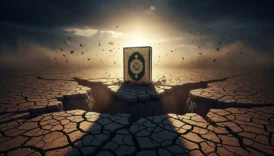Islam’s Definition And Meaning
Islam is not merely a religion; it is a unique way of life that provides guidance in every aspect of existence, shaping the spiritual and moral structure of individuals. As a devout believer, I deeply acknowledge that Islam is a sublime quality that fosters inner peace, justice, societal solidarity, and a sense of brotherhood. In this article, I will comprehensively explore the definition and meaning of Islam, grounding the discussion in authentic sources. Throughout, I will maintain sincerity and genuineness, drawing upon the Quran and the Sunnah to offer a profound explanation of what Islam truly signifies.
- Islam’s Definition And Meaning
- Islam's Definition
- Islam's Meaning
- The Qur’an And Islam
- The Sunnah And The Prophet’s Example
- Worship And Daily Life
- Duas And Verses
- Surah Al-Fatiha
- Surah Al-Ikhlas
- Morality And Social Life
- Islam And Knowledge
- The Profound Meaning Of Worship In Islam
- Spiritual Depth And Submission
- Communal Brotherhood And Unity
- Islam And The Modern World
- Patience, Gratitude, And Trust In Islam
- Spiritual Journey And Righteous Direction
- Justice And Compassion In Islam
- Wisdom And Insight In Islam
- Islam And Modern Education
- Islam’s Universal Message
- Personal Experiences And The Journey Of Faith
- The Power Of Dua And Dhikr
- Gratitude And Thankfulness In Islam
- Family And Community In Islam
- Islam’s Universal Values
- Spiritual And Social Transformation
- Islam And Inner Peace
- Final Word
- References
Islam’s Definition
The term “Islam” derives from the Arabic root “سلام” (salām), meaning “peace,” “submission,” and “security.” To be a Muslim is to fully submit to Allah and place His commands at the heart of one’s life. Islam is the path to attaining peace in both the heart and body, encompassing belief in the oneness of Allah, adherence to His prophets, and faith in the hereafter.
Among the core concepts that every Muslim must hold in their heart is tawhid, the belief in the absolute oneness of Allah, rejecting any partners or associates. This conviction shapes all steps, acts of worship, and social relationships in a believer’s life. Islam purifies an individual from the negative inclinations of the self, leading to a spiritual and moral elevation.
Islam’s Meaning
Islam extends beyond the boundaries of worship alone; it manifests in every area of life. In this sense, Islam incorporates values such as justice, compassion, patience, tolerance, and brotherhood. As a Muslim, I believe that Islam should not be confined solely to rituals like prayer, fasting, and almsgiving; rather, it calls for demonstrating conduct that earns Allah’s pleasure in daily life, acting with honesty and love toward others.
Islam delivers a universal message that fosters social order, equality, and justice among people, emphasizing a foundation of love for humanity. By steadfastly upholding these values, Muslim societies strive to achieve peace and prosperity, both individually and collectively. A life governed by harmony, affection, and benevolence enables believers and communities to continually renew and evolve.
The Qur’an And Islam
The Qur’an is the holy book of Islam and serves as the primary source of divine revelation for Muslims. This exalted scripture guides believers in all aspects of life, presenting universal moral principles to humanity. The Qur’an, as the word of Allah, addresses numerous subjects comprehensively, from the creation of the universe to the existence of humankind.
A prominent feature of the Qur’an is its emphasis on contemplation, questioning, and comprehension. In this regard, Islam speaks to the intellect, logic, and heart, guiding individuals toward truth. Each verse is a treasury of profound meanings, offering direction in every domain of life and inspiring countless scholars throughout history.
The Sunnah And The Prophet’s Example
Alongside the Qur’an, the Sunnah of Prophet Muhammad (peace be upon him) is an integral component of practicing Islam. Our Prophet exemplified Islam in the most beautiful manner; through his words, actions, and way of life, he provided a perfect model for us. His life radiated patience, justice, compassion, and selflessness.
For Muslims, the Sunnah is not merely a historical record; it is also a guide for the present and future. The Prophet’s exemplary life illuminates various spheres, from social interactions and family life to acts of worship and social responsibility. His sayings reinforce our moral principles and shape our behavior.
Worship And Daily Life
One of the most defining attributes of Islam is the central role of worship. Prayer, fasting, almsgiving, and pilgrimage (Hajj) symbolize a Muslim’s devotion and submission to Allah. These acts of worship not only strengthen one’s spirituality but also reflect social solidarity.
In everyday life, Islam encourages believers to recognize the significance of every moment. The peaceful call to prayer at dawn reminds one to turn to Allah with the first light of day. As a Muslim, filling every moment with worship, gratitude, and supplication—facing challenges with patience and composure—holds immense importance.
Duas And Verses
In Islam, supplication (dua) is the heart’s gateway to Allah. It brings deep serenity and submission in moments of joy and sorrow alike. Reciting verses and prayers during dua reminds us of Allah’s presence, power, and mercy. Below are some examples of prayers and Quranic verses:
Surah Al-Fatiha
Arabic:
بِسْمِ اللَّهِ الرَّحْمَنِ الرَّحِيمِ
الْحَمْدُ لِلَّهِ رَبِّ الْعَالَمِينَ
الرَّحْمَنِ الرَّحِيمِ
مَالِكِ يَوْمِ الدِّينِ
إِيَّاكَ نَعْبُدُ وَإِيَّاكَ نَسْتَعِينُ
اهْدِنَا الصِّرَاطَ الْمُسْتَقِيمَ
صِرَاطَ الَّذِينَ أَنْعَمْتَ عَلَيْهِمْ غَيْرِ الْمَغْضُوبِ عَلَيْهِمْ وَلَا الضَّالِّينَ
Transliteration:
Bismillâhir-Rahmânir-Rahîm
Elhamdü lillâhi rabbil âlemîn
Er-Rahmânir-Rahîm
Mâliki yevmiddîn
İyyâke na’budu ve iyyâke nesta’în
İhdinâ’s-sirâtel mustakîm
Sirâtellezîne en’amte aleyhim ğayril mağdûbi aleyhim ve leddâllîn
Meaning:
In the name of Allah, the Most Compassionate, the Most Merciful.
All praise is due to Allah, Lord of the worlds.
The Most Compassionate, the Most Merciful.
Master of the Day of Judgment.
You alone we worship, and You alone we ask for help.
Guide us to the straight path.
The path of those upon whom You have bestowed favor, not of those who have incurred [Your] wrath or gone astray.
Surah Al-Ikhlas
Arabic:
قُلْ هُوَ اللَّهُ أَحَدٌ
اللَّهُ الصَّمَدُ
لَمْ يَلِدْ وَلَمْ يُولَدْ
وَلَمْ يَكُن لَّهُ كُفُوًا أَحَدٌ
Transliteration:
Kul huvallâhuh ehad
Allâhus-semad
Lem yelid ve lem yüled
Ve lem yekun lehu kufuven ehad
Meaning:
Say, “He is Allah, [who is] One.
Allah, the Eternal Refuge.
He neither begets nor is born.
Nor is there to Him any equivalent.”
These verses emphasize the core tenets of Islamic faith and the uniqueness of Allah. Through them, every Muslim can profoundly experience love, devotion, and submission to Allah.
Morality And Social Life
In Islam, morality is not confined to individual acts of worship; it also emphasizes virtues such as justice, compassion, patience, and tolerance in social life. As a Muslim, it is fundamental to exhibit exemplary behavior in community relations, family life, and collective solidarity.
In Islam, morality stems from an innate love and devotion. The Prophet (peace be upon him) said, “He who sleeps full while his neighbor is hungry is not one of us,” reminding us of the importance of social responsibility and mutual support. Practicing justice and fairness in our actions not only fosters personal spiritual growth but also fortifies social harmony.
Islam And Knowledge
Throughout Muslim civilization, knowledge and scholarship have always been esteemed and encouraged. Islam supports the pursuit of knowledge in both religious and worldly matters. The Prophet Muhammad (peace be upon him) said, “Seeking knowledge is an obligation upon every Muslim,” underlining the significance of learning and intellectual inquiry.
In this regard, Muslim civilization achieved remarkable progress in mathematics, astronomy, medicine, philosophy, and many other fields. Such advancements illustrate how the religion values the enlightening power of knowledge and reason, guiding humanity in every sphere of life.
The Profound Meaning Of Worship In Islam
Worship is one of the main pillars of Islam. Prayer (salah), fasting (sawm), almsgiving (zakat), and pilgrimage (Hajj) are central acts of worship that represent the believer’s relationship with Allah. Each of these practices purifies the soul and imparts spiritual tranquility and discipline.
Notably, prayer provides an opportunity five times a day for believers to detach from worldly concerns and reconnect with Allah. In Islam, fasting refines the self, fosters patience, and reinforces social solidarity. Almsgiving (zakat) ensures the fair distribution of wealth, contributing to social justice, while the pilgrimage to Mecca unites believers in a grand assembly, symbolizing unity and fraternity.
Spiritual Depth And Submission
Islam underscores the importance of submitting to Allah at every moment in life. Being a Muslim involves not only external forms of worship but also an internal transformation and renewal. Every believer acts in pursuit of Allah’s pleasure, thereby cultivating profound tranquility and joy in the heart.
Submission to Allah liberates individuals from worldly anxieties, allowing genuine peace to flourish within. This devotion extends beyond formal worship to include sincere conduct in all areas of life. Believers draw strength and resilience from turning to Allah with patience, gratitude, and prayer, even when facing life’s challenges.
Communal Brotherhood And Unity
Beyond personal devotion, Islam emphasizes communal solidarity. One of the key attributes of a Muslim is a commitment to social peace, fraternity, and mutual assistance. The sense of brotherhood instilled by Islam nurtures a mindset rooted in equality, justice, and compassion within the community.
The life of the Prophet (peace be upon him) provides a prime example of this spirit of brotherhood. Love for neighbors, kindness, mercy, and helping others are the cornerstones of Islamic society. Consequently, social order and unity are upheld, reflecting the profound beauty of our religion.
Islam And The Modern World
In today’s world, concepts like modernization, technological advancement, and globalization come to the forefront, yet Islam’s universal message remains timeless. As Muslims, while adapting to the evolving global order, we continue to uphold the core Islamic values of peace, justice, and compassion.
Islam encourages believers to embrace contemporary developments without compromising on the fundamental values of the faith. This balance showcases Islam’s universal nature, enabling the preservation of traditional Islamic values while navigating modern challenges. As a universal religion, Islam consistently seeks harmony with the shared values of humanity.
Patience, Gratitude, And Trust In Islam
In a Muslim’s life journey, challenges highlight the significance of patience and faith. Islam regards patience (sabr) as a virtue, teaching that trials and tribulations are temporary, whereas patience and trust in Allah (tawakkul) pave the way for lasting peace.
Many verses in the Qur’an underscore the value of patience for believers. Similarly, gratitude (shukr) is the act of thanking Allah for every blessing. Trust in Allah means relying on His decree beyond one’s own efforts, firmly believing that He governs all affairs. These virtues reinforce both spiritual and psychological well-being.
Spiritual Journey And Righteous Direction
Islam encourages believers to embark on a spiritual journey. This path is one of ongoing exploration, learning, and inner development. Worship, prayer, remembrance (dhikr), and reflection (tafakkur) are the means by which a person draws closer to Allah and attains tranquility in His presence.
Each prayer time allows the heart to be cleansed anew, detaching from worldly burdens and finding solace in divine communion. Islam’s spiritual depth guides believers not only in this world but also in the hereafter. In this regard, dhikr and reflection enlighten one’s inner being and give profound meaning to life.
Justice And Compassion In Islam
Justice and compassion are two foundational pillars of Islam. Every Muslim must uphold justice and show compassion in all dealings. Islam commands the establishment of social justice, the protection of the vulnerable, and the support of the oppressed.
The Qur’an frequently emphasizes the importance of justice, conveying that “Justice is among the matters that Allah loves you to uphold.” These verses highlight that justice must be maintained both individually and collectively. Compassion, on the other hand, touches hearts and brings people together, fostering a spirit of kindness and empathy. In an Islamic society, acts of charity and compassion shape the core of neighborly bonds and collective harmony.
Wisdom And Insight In Islam
Islam calls upon believers not only to worship but also to live by wisdom, insight, and reason. The Prophet Muhammad’s (peace be upon him) life reflects the significance of both worship and the judicious use of intellect.
The Qur’an states, “Indeed, there are signs for people of understanding,” underscoring the value of knowledge and wisdom. These lessons inspire people to make conscious decisions, pursue justice, and search for truth. As a Muslim, my passion for knowledge and wisdom not only supports worldly achievements but also enhances spiritual depth and inner tranquility.
Islam And Modern Education
In the modern era, the profound educational heritage of Islamic civilization remains a source of inspiration. From traditional madrasahs to modern institutions, the Muslim world places great emphasis on knowledge.
As Muslims, we strengthen our religious understanding and keep pace with scientific and technological advancements through education. This balance reveals the flexible and universal structure of Islam, allowing us to benefit from both traditional sciences and modern opportunities alike.
Islam’s Universal Message
Islam speaks to all of humanity, not solely to Muslims. Its essence comprises universal values such as justice, mercy, tolerance, patience, and wisdom. These values bring together people of diverse cultures and civilizations, uniting them through a shared sense of brotherhood.
The universality of Islam is evident in its fundamental sources: the Qur’an and the Sunnah. Every verse and hadith delivers a message for humankind, for each creation is a reflection of Allah. This belief fosters closeness among people, breaking down prejudices and laying the foundations of global harmony.
Personal Experiences And The Journey Of Faith
For me, Islam represents a journey of understanding life’s purpose, seeking direction, and nurturing hope. In my daily routine, I find profound serenity during the morning prayer. Beginning each day in the name of Allah, with faith and gratitude, purifies my soul in those cherished moments.
In facing hardships, turning to Allah in prayer endows me with patience and strength. Each act of worship leaves a lasting spiritual impression on my heart. My faith journey is not only a religious practice but also an internal discovery that brings deeper meaning to life. In each supplication and remembrance, I sense a light that dispels darkness from within.
The Power Of Dua And Dhikr
Dua (supplication) is among the most intimate moments of opening one’s heart to Allah. Whether done privately or collectively, dua deepens one’s spiritual realm and fosters hope. Dhikr (remembrance of Allah) is an act of worship that involves constantly recalling His majesty. Through dhikr, every moment of life is filled with the remembrance of Allah.
For instance, the phrase “Subhânallâhi ve bi-hamdih” is a dhikr that denotes purification and praise of Allah, bringing profound peace to the heart.
Arabic:
سُبْحَانَ اللَّهِ وَبِحَمْدِهِ
Transliteration:
Subhânallâhi ve bi-hamdih
Meaning:
I glorify Allah free of all imperfections, and I praise Him.
This remembrance helps the heart remain attuned to seeking Allah’s pleasure at every moment, distancing the mind from worldly troubles and ushering in spiritual tranquility.
Gratitude And Thankfulness In Islam
Islam instructs believers to express gratitude and thankfulness (shukr) for every blessing. Every bounty is viewed as a gift from Allah, worthy of constant appreciation. In daily life, giving thanks to Allah for even the smallest favor purifies the heart and cultivates humility.
Gratitude also becomes a means of solidarity in the face of adversity; a grateful heart grows closer to Allah and seeks His guidance in every difficulty. This fosters spiritual strength and an appreciation for every moment in life.
Family And Community In Islam
Islam holds the family structure and societal unity in high regard. The family is the initial social environment for Muslims, the first place of learning and moral development. The values instilled by parents form the basis of Islamic ethics. Meanwhile, love, respect, and understanding among family members are crucial for fostering social peace and harmony.
Within the community, good neighborly relations and mutual support reflect the essence of Islam. The Prophet (peace be upon him) reminded us, “He who sleeps full while his neighbor is hungry is not one of us,” emphasizing the significance of communal support and assistance. Thus, the brotherhood instilled by Islam fortifies social life on solid moral foundations.
Islam’s Universal Values
Islam upholds universal values that transcend the Muslim community and extend to all humanity. Concepts such as justice, mercy, tolerance, patience, and wisdom are at the heart of Islamic teachings. When practiced in daily life, these values secure peace and tranquility both for individuals and society.
Islam’s universalism is evident in its primary sources, the Qur’an and the Sunnah. These teachings build bridges among diverse peoples, cultures, and civilizations, reinforcing our shared human identity.
Spiritual And Social Transformation
Islam not only facilitates the inner transformation of individuals but also renews social structures. Each believer’s spiritual metamorphosis positively influences community life. This transformation is realized when virtues like patience, gratitude, justice, and compassion flourish in all areas of life.
Islam envisions a social order built on justice, equality, and brotherhood. Consequently, every Muslim’s personal spiritual development forms the cornerstone of communal peace and well-being.
Islam And Inner Peace
Inner peace is one of the most vital elements in a Muslim’s life. This tranquility arises from deep devotion to Allah, continual acts of worship, and heartfelt supplications. By nurturing a believer’s spiritual world, Islam paves the way for true happiness and serenity.
Even amid the hustle of daily life, remembering Allah’s names brings calm to the heart. Prayer times offer moments to detach from worldly distractions, turning to Allah’s mercy. This spiritual experience frees the believer from worldly anxieties, granting purpose and depth to life.
Final Word
In conclusion, Islam serves as the foundation of personal spiritual growth, communal solidarity, justice, and a life guided by universal values. The definition of Islam extends beyond rituals, calling for seeking Allah’s pleasure in every aspect of existence. The Qur’an and the Sunnah offer direction, while supplication, remembrance, patience, and gratitude illuminate our hearts and beautify our lives. Each Muslim, guided by the teachings of this profound faith, strives to improve themselves and society. Islam’s universality unites people from diverse cultures, creating a shared consciousness of humanity. Our faith is not merely an individual endeavor but a philosophy of life that stands on brotherhood, love, and responsibility.
References
- Tafsir Ibn Kathir
- Sahih al-Bukhari
- Sahih Muslim
- Tafsir al-Ja’fari
- Rızaü’l-Emîn Works
This article presents a comprehensive exploration of Islam’s definition and meaning, grounded in authentic sources, conveyed with sincerity and warmth. Each paragraph aims to highlight the spiritual depth of Islam, its social dimension, and its influence on personal transformation. I hope this writing offers inspiration in your faith, enhances the tranquility in your heart, and provides guidance for your life.




